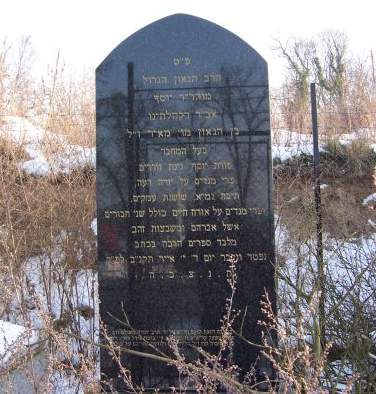Pri Megadim on:
[Wikipedia]
[Google]
[Amazon]
 Joseph ben Meir Teomim (1727–1792;
Joseph ben Meir Teomim (1727–1792;
 Joseph ben Meir Teomim (1727–1792;
Joseph ben Meir Teomim (1727–1792; Hebrew
Hebrew (; ''ʿÎbrit'') is a Northwest Semitic languages, Northwest Semitic language within the Afroasiatic languages, Afroasiatic language family. A regional dialect of the Canaanite languages, it was natively spoken by the Israelites and ...
: יוסף בן מאיר תאומים)
was a Galician rabbi
A rabbi (; ) is a spiritual leader or religious teacher in Judaism. One becomes a rabbi by being ordained by another rabbi—known as ''semikha''—following a course of study of Jewish history and texts such as the Talmud. The basic form of t ...
, best known as author of ''Pri Megadim'', by which title he is also referenced.
He was one of the foremost Torah Scholars of his time, a "thorough student of rabbinical literature
Rabbinic literature, in its broadest sense, is the entire corpus of works authored by rabbis throughout Jewish history. The term typically refers to literature from the Talmudic era (70–640 CE), as opposed to medieval and modern rabbinic w ...
, and... not unlearned in the secular sciences".
Biography
Teomim was born in Shchyrets, then inPoland
Poland, officially the Republic of Poland, is a country in Central Europe. It extends from the Baltic Sea in the north to the Sudetes and Carpathian Mountains in the south, bordered by Lithuania and Russia to the northeast, Belarus and Ukrai ...
(today in Ukraine
Ukraine is a country in Eastern Europe. It is the List of European countries by area, second-largest country in Europe after Russia, which Russia–Ukraine border, borders it to the east and northeast. Ukraine also borders Belarus to the nor ...
).
His father, Rabbi Meir Teomim, became Dayan (rabbinic judge) and Rosh Yeshiva
Rosh yeshiva or Rosh Hayeshiva (, plural, pl. , '; Anglicized pl. ''rosh yeshivas'') is the title given to the dean of a yeshiva, a Jewish educational institution that focuses on the study of traditional religious texts, primarily the Talmud and th ...
in Lemberg
Lviv ( or ; ; ; see #Names and symbols, below for other names) is the largest city in western Ukraine, as well as the List of cities in Ukraine, fifth-largest city in Ukraine, with a population of It serves as the administrative centre of ...
(Lvov), and the family moved there.
Teomim studied Torah, primarily under his father, in the Lvov yeshivah
A yeshiva (; ; pl. , or ) is a traditional Jewish educational institution focused on the study of Rabbinic literature, primarily the Talmud and halacha (Jewish law), while Torah and Jewish philosophy are studied in parallel. The studyin ...
; while still young he took up a position as "preacher and rabbinical instructor" there.
At the age of 20 he moved to Komarno to marry. He spent more than a decade there primarily studying and writing, and also working as a ''melamed
Melamed, ''Melammed'' ( "teacher") in Biblical times denoted a religious teacher or instructor in general (e.g., in Psalm 119:99 and Proverbs 5:13), but which in the Talmudic period was applied especially to a teacher of children, and was almost i ...
''.
In 1767, on the invitation of Daniel Itzig, he went to Berlin
Berlin ( ; ) is the Capital of Germany, capital and largest city of Germany, by both area and List of cities in Germany by population, population. With 3.7 million inhabitants, it has the List of cities in the European Union by population withi ...
to co-head a ''Bet Midrash
A ''beth midrash'' (, "house of learning"; : ''batei midrash''), also ''beis medrash'' or ''beit midrash'', is a hall dedicated for Torah study, often translated as a "study hall". It is distinct from a synagogue (''beth knesseth''), although ...
'' with Rabbi Hirschel Levin.
Following his Father's death in 1771, Teomim returned to Lemberg, eventually becoming Dayan there.
In 1782 he was appointed Rabbi at Frankfurt an der Oder
Frankfurt (Oder), also known as Frankfurt an der Oder (, ; Marchian dialects, Central Marchian: ''Frankfort an de Oder,'' ) is the fourth-largest city in the German state of Brandenburg after Potsdam, Cottbus and Brandenburg an der Havel. With a ...
, where he remained until his death.
He was buried in the Jewish cemetery
A Jewish cemetery ( ''beit almin'' or ''beit kvarot'') is a cemetery where Jews are buried in keeping with Halakha, Jewish tradition. Cemeteries are referred to in several different ways in Hebrew, including ''beit kevarot'' (house of s ...
at Frankfurt/Oder.
Works
Teomim's ''Pri Megadim'' (פרי מגדים, "choice fruits", published 1782) is a widely referenced work on the '' Shulkhan Aruch''. It is composed, essentially, as a supercommentary on the major commentators there: on the '' Orach chayyim'' section, ''Mishbetzot Zahav'' discusses David ben Samuel's ''Turei Zahav,'' and ''Eshel Avraham'' is onAvraham Gombiner
Abraham Abele Gombiner () ( – 5 October 1682), known as the Magen Avraham, born in Gąbin (Gombin), Poland, was a rabbi, Talmudist and a leading religious authority in the Jewish community of Kalisz, Poland, during the seventeenth century. Hi ...
's ''Magen Avraham''; on the Yoreh De'ah
''Yoreh De'ah'' () is a section of Rabbi Jacob ben Asher's compilation of halakha (Jewish law), the ''Arba'ah Turim'', written around 1300.
This section treats all aspects of Jewish law not pertinent to the Hebrew calendar, finance, torts, marr ...
section, ''Siftei Da'at'' discusses Shabbethai Kohen's ''Siftei Kohen'', and ''Mishbetzot Zahav'' is continued. ''Pri Megadim'' is however seen as authoritative in its own right, often quoted, for example, by the Mishna Berurah.
Teomim also authored, among other works:
* ''Porat Yosef,'' novellæ
{{Short pages monitor